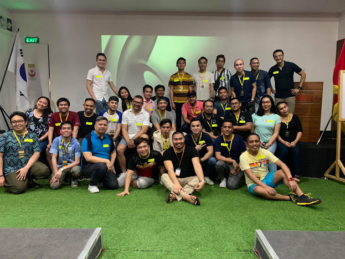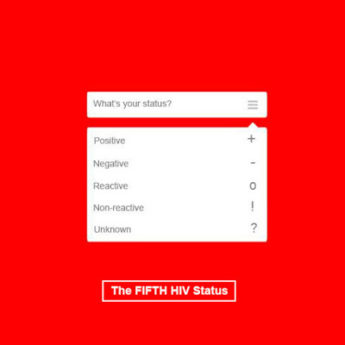“Am I going to die soon?” This is one of the first few questions a person newly diagnosed as positive with HIV would usually ask their counselor/healthcare provider. The answer is a resounding “No.” Being diagnosed as HIV positive means a person has the Human Immunodeficiency Virus (HIV) in their body, and it doesn’t mean the person will immediately die of the virus. How soon a person living with HIV (PLHIV) will die under natural circumstances depends on the line between HIV taking control of their body or them having control of the virus.

To better know what healthcare measures PLHIVs should commit themselves to, we must first understand what this virus does to the body. Once infected with the virus, immune system cells called CD4 lymphocytes or T-cells are either directly killed or penetrated and then used by the virus as hosts in which to replicate. Once the penetrated CD4 cells can no longer contain the virus, they explode and result in a higher viral load and a weakened immune system. If nothing is done to intervene, the condition will progress to Acquired Immunodeficiency Syndrome (AIDS) – the stage of HIV infection described as having a weakened immune system and being infected with opportunistic infections that can lead to death.
Therefore, the focus of concern here is to strengthen the immune system. It gives the message to do things that boost the immune system and turn away from those that further weaken it. Here are simple ways to a healthier, more positive life:
Adherence to Treatment
Dubbed as Timely Testing and Treatment by LoveYourself’s Triangle of Self-Care, it encourages PLHIVs to adhere to the antiretroviral therapy (ART) given to them by their healthcare providers. ART prevents HIV from penetrating and killing CD4 cells, keeping the viral load low. On the other hand, skipping, discontinuing, or not taking ART at all will lead to AIDS and eventually, death. This is why it is smart for PLHIVs to religiously follow their treatment regimen on the dot.
Balanced Diet and Exercise
Healthy food not only helps boost the immune system, but it also helps deal with symptoms brought about by HIV such as weight loss and diarrhea which may be experienced by some. For a healthy and balanced diet, eat more fruits and vegetables for more fiber, vitamins and minerals, protein-rich foods for building stronger muscles, carbohydrates like brown rice and potato to give you the energy you need, and of course, small amounts of fats, sugar, and salt.
Eating healthier always comes with regular exercise. Keeping a regular physical activity that is fit for you three to four times a week does more than just keep the immune system strong. Exercise helps release happy hormones called endorphins which reduce stress – one of the major contributors to a weakened immune system. Exercise also boosts energy and keeps bones strong to prevent osteoporosis. Also remember to have enough quality rest every day. So eat right, move right, and sleep right.
Counseling and Support
A healthy lifestyle is not limited to staying physically healthy – it also addresses mental health. Receiving news that you are infected with HIV may not be that easy to take in, and for some, adjustment takes time. Some people may be extremely bothered by their worries and questions causing anxiety, loss of appetite, loss of motivation, and lack of sleep. Experiencing all of these at the same time negatively affects the immune system as well. Talk to a trained HIV counselor about your thoughts and feelings, and if you are ready, you may also disclose these to your family, partner, and/or friends. Sharing your burdens with someone whom you can trust always gives you a lighter feeling, and gaining the support of the people around you can keep your head in the game.
Don’t Engage in Substance Use
Avoid using drugs and sharing needles as PLHIVs with weakened immune system are more prone to being infected with other diseases such as Hepatitis B and/or C. Meanwhile, the use of alcohol, being a downer, decreases energy and lowers the level of your immune system. Furthermore, using either or both impairs judgment, which increases the chances of you engaging in risky behaviors like unprotected penetrative sex. Smoking is never a healthy option. There are numerous opportunistic infections, and two of the most common airborne infections are pneumonia and tuberculosis. You will not want to further deteriorate your lungs, increase stress, and crash your immune system by smoking.
Exercise Protected Sex
Dubbed as Safe and Satisfying Sex and Consistent Use of Condom by LoveYourself’s Triangle of Self-Care – the use of condoms is not only for preventing the spread of HIV but also for other sexually transmitted infections (STI). Being infected with HIV does not permit you to engage in unprotected sexual intercourse. It is still encouraged to correctly and consistently use condoms to prevent you from being exposed from different STIs like syphilis and gonorrhea.
To sum it up, PLHIVs should adhere to their treatment, keep themselves physically, mentally, and emotionally healthy, and practice protected sex. It is not really far from what we usually have to do in general regardless of our HIV status. Dr. Rossana A. Ditangco, Head of AIDS Research Group in the Research Institute for Tropical Medicine said, “I would always tell them (PLHIVs) that a healthy lifestyle is simply common sense. What is advised to a person without HIV will be the same advice given to those with HIV. There is no special recommendation. The principle is: Being HIV positive will not make you any different from somebody without HIV infection; you are the same person – in that way, you should really feel normal and feel no difference.” So whatever your HIV status is, just remember this: “Hey, love yourself.”
Text by Reiner “Meow” Grospe
Icons sourced online
Model: David Millner



